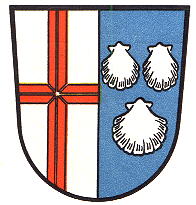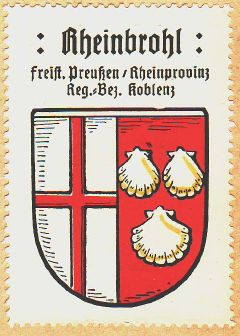Rheinbrohl: Difference between revisions
Knorrepoes (talk | contribs) m (Text replacement - "↵↵'''" to "'''") |
Knorrepoes (talk | contribs) m (Text replacement - " :[[" to " : [[") Tags: Mobile edit Mobile web edit |
||
| (2 intermediate revisions by the same user not shown) | |||
| Line 30: | Line 30: | ||
{{media}} | {{media}} | ||
[[Civic Heraldry Literature - Germany|'''Literature''']]: Stadler, 1964-1971, 8 volumes; Hupp, O: [[Kaffee Hag albums]], 1920s | [[Civic Heraldry Literature - Germany|'''Literature''']]: Stadler, 1964-1971, 8 volumes; Hupp, O:[[Kaffee Hag albums]], 1920s | ||
[[Category:German Municipalities R]] | [[Category:German Municipalities R]] | ||
Latest revision as of 06:24, 13 August 2024
RHEINBROHL
State : Rheinland-Pfalz
District (Kreis) : Neuwied
Verbandsgemeinde : Verbandsgemeinde Bad Hönningen
| German | Gespalten von Silber und Blau; vorn ein durchgehendes rotes Balkenkreuz, hinten drei, zwei zu eins gestellte silberne Pilgermuscheln. |
| English | blazon wanted |
Origin/meaning
The arms were granted in 1949.
The arms first appear on the seal of the village, dating from the early 17th century. On the seal the patron saint, St. Gertrud is shown as a supporter behind the shield. The shells are most likely derived from the arms of the Metternich family. Therefore the arms date from around 1610 when Lothar von Metternich was Archbishop of Trier. Hupp explained the shells as from the arms of Archbishop Jacob von Sierk (1439-1456, the shells are then canting, as they ar ethe attribute of St. James, Jacobus), and thu sof older origin. The town historically belonged to the State of Trier. The red cross is the symbol of the State of Trier.
| The arms by Hupp in the Kaffee Hag albums +/- 1925 |
This page is part of the German heraldry portal Deutsche Wappensammlung |
Heraldry of the World |
|
German heraldry:
|
Selected collector's items from Germany:
|
Contact and Support
Partners:
Your logo here ?
Contact us
© since 1995, Heraldry of the World, Ralf Hartemink 
Index of the site
Literature: Stadler, 1964-1971, 8 volumes; Hupp, O:Kaffee Hag albums, 1920s













